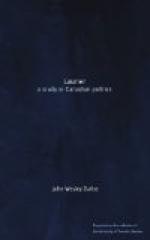In 1908 Sir Wilfrid, when a discerning electorate had deprived him of a colleague whose political incapacity had been completely demonstrated, became a party to a deal by which he re-entered parliament. An old friend took the liberty of asking Sir Wilfrid why he wanted this associate back in the cabinet, only to be told that “So-and-So never made any trouble for me.” At least twice in the last four years of his regime Sir Wilfrid, conscious of the waning energies of his party, took advice outside of his immediate circle as to what should be done; on both occasions he rejected advice tendered to him because this involved the inclusion in the cabinet of personalities that might have disturbed the charmed serenity of that circle. Sir Wilfrid preferred to have things as they were, perhaps because his sense of reality warned him that, so far as the duration of time during which he would hold office was concerned, there probably would not be any great difference between a government wholly agreeable to him and one reconstituted to meet the demand of the younger and more vigorous elements in the party. In 1909, in a letter to a supporter who had lost the party nomination for his constituency, he gave premonition of his own fate: “What has happened to you in your county will happen to me before long in Canada. Let us submit with good grace to the inevitable.”
The inevitable end in the ordinary course of events would have been the going on of the party until it died of dry rot and decay, as the Liberals had already died in Ontario; but fortunately, both for the party and for Laurier’s subsequent fame—though it may not have seemed so at the time—emergence of the reciprocity question gave it an opportunity to fall on an issue which seemed to link up the end of the regime with its heroic beginnings and to reinvest the party with some of its lost glamor.
LAURIER: DEFEAT AND ANTI-CLIMAX
The defeat of the Liberals in September, 1911, raised sharply the question of the party’s future and the leadership under which it would face that future. Speaking at St. Jerome toward the close of the campaign Sir Wilfrid had stated positively that if defeated he would retire. This declaration of intention—no doubt at the moment sincerely made—was designed to check the falling away from Laurier’s leadership in Quebec, which was becoming more noticeable as election day drew near. But the appeal was ineffective.. The effective opposition to Laurier in Quebec came not from Borden or from Monk, the official leader of the French Conservatives, but from Bourassa. Laurier and his lieutenants fought desperately, but in vain, to break the strengthening hold of the younger man on the sympathies of the French electors. In Quebec the custom of the joint open air political meeting is still popular, and at such a concourse in St. Hyacinthe, an old Liberal stronghold, Sir Wilfrid’s colleagues, Lemieux and Beland,




